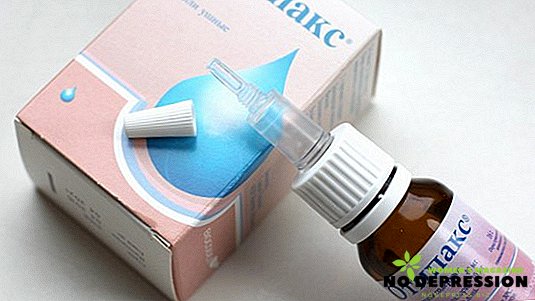Pregnancy is a very crucial period in the life of a woman. At this time, she has to think not only about herself, but also about the child growing inside. Everything that a mother consumes, be it food or medicine, affects the baby by entering his body through organs that connect with his mother.

Therefore, the majority of drugs are prohibited at the moment of childbearing, however, the mother’s diseases harm not only herself, but also affect the future health of the baby. Therefore, it is important to understand what a failure in the mother's body is, what the consequences may be, and also what treatment can be used.
Even the most common cold can lead to unexpected complications. To cope with this, you need to treat it properly.
Features of the course and cold symptoms during pregnancy
Pregnancy itself arises in particular against the background of a decrease in immunity, since in this way the organism adapts to the situation and allows the embryo to consolidate. Otherwise, the protective functions of the body would repel the alien body and the pregnancy did not occur.
 But thanks to this wonderful adaptation, the probability of getting sick in a pregnant woman is somewhat higher than in her, but in the normal state. Somewhat reduced immunity remains throughout the entire gestation period.
But thanks to this wonderful adaptation, the probability of getting sick in a pregnant woman is somewhat higher than in her, but in the normal state. Somewhat reduced immunity remains throughout the entire gestation period.
Due to this, the occurrence of a cold may not go too noticeably. One of the most tangible signs of her arrival is usually an increase in body temperature, which in the case of pregnancy may not occur at all. A weakened body does not respond to the threat.
Therefore, you should be attentive to all the changes taking place. Slightly elevated temperature, runny nose, weakness, burning in the throat and on the mucous membranes can signal a cold.
This disease occurs in pregnant women as well as in any other people. But in no case should you bear a cold "on your feet" and postpone treatment.
The sooner the cause of the disease is eliminated, the better for mother and baby. Transferred colds can lead to complications, malfunctions of various organs, as well as affect the development of the crumbs.
Possible complications and consequences for mother and baby
At different stages of fetal development, the common cold threatens with various complications. It is customary to divide the time of carrying into 3 parts - trimesters. Here are the consequences of a cold, which is not cured in time, in each of them:
- the first 10 weeks of pregnancy in the first trimester, the most dangerous for the occurrence of colds; At this time, many systems and organs form in the embryo, including the nervous system, heart, esophagus, sensory organs, parts of the body; after the 9th week, a fetus is formed, which slowly develops, it has a circulatory system, liver, genitals; during this period, it is generally undesirable to get sick, since any viruses or infection can have an unexpected effect on the development of the embryo, and after the fetus, which is unable to cope with their attacks; in addition to colliding with viruses, the fetus may receive less oxygen due to the disease in the mother’s body;
- from 12 to 24 weeks of pregnancy, which belong to the II trimester, the placenta is already fully formed and is responsible for the safety of the baby, who, by that time, is already quite well developed; the placenta not only protects the crumbs from any negative impact, but also carries to it all the necessary substances, including oxygen; this is the main danger, because during a cold, this function decreases, which can cause feto-placental insufficiency, due to which the baby will receive less nutrients and oxygen, which can lead to hypoxia or even cause premature delivery of premature child; Also, a cold at this time can affect the development of a child, especially affecting his nervous system, bone formation, endocrine system and even infertility of girls who have eggs during this period;

- despite the formed fetus, a cold in the third trimester, which lasts from 24 weeks to the moment of delivery, is still very dangerous; At this time, the mother's body suffers high enough loads, so an additional temperature increase, nasal congestion, sneezing or coughing will only aggravate the situation, worsening and weighing down her condition; the child at this moment, despite the protective function of the placenta, may catch a cold; there is also the danger of premature birth, therefore, in the last weeks of pregnancy, colds must also be treated with great attention.
Cold treatment at different periods of pregnancy
Every trimester is the formation of the baby. He has internal organs, systems, various functions of his body are laid.
Mama's illness causes failure not only in the functioning of her systems. But it can also cause an irreparable change in the body of her unborn child.
What was broken at this stage will not be returned. Therefore, it is extremely important to notice the disease in time and begin to act as soon as possible in order to cope with it.
The inability to use most drugs complicates the solution of this problem, but the key to success will be the speed of response and the onset of actions, their systematic nature and compliance with medical prescriptions.
But even if the medication was prescribed or selected independently, it is important to carefully study the instructions and not to exceed the dosage. During pregnancy, you should not be guided by the idea that a large dosage will help to cure sooner and bring less danger to the baby. In this case, a smaller dose is much better than the other way around.

Cold treatment during early pregnancy in the first trimester
If symptoms or just a suspicion arises that a pregnant woman has a cold, the first thing is to contact a doctor where she is observed as soon as possible. This item refers to absolutely any period, because if medication is required, only a doctor can prescribe specific pills.
Most of them are prohibited during pregnancy, and it is precisely this that causes a cold during this period. However, the doctor can give advice on how to transfer the illness faster and without complications.
 It is not possible to treat a cold by yourself with taking any conventional medicine. In any case, in the instructions of most of them in the section "contraindications" there will be a point about pregnancy and lactation.
It is not possible to treat a cold by yourself with taking any conventional medicine. In any case, in the instructions of most of them in the section "contraindications" there will be a point about pregnancy and lactation.
However, to comply with the regime, it is possible and necessary to drink plenty of warm liquids. But the use of extreme methods is not recommended. Only the physician will tell you what to do so that the cold will end quickly and not develop into more serious diseases.
Cold treatment during pregnancy in the 2nd trimester
The second trimester is the most stable. Any changes in the mother's body are not too drastic for the little one, but still it is impossible to start a cold.
At the first sign of a need to consult a doctor. And here, as at any other moment of pregnancy, antibiotics and antivirals are prohibited.
That is why such drugs are not only meaningless, but also dangerous. After all, the longer the mother is sick, the more likely the baby can become infected.
Cold treatment during pregnancy in the 3rd trimester
 The third trimester is the most crucial, especially the last weeks before childbirth. If at this time get sick, then you can give birth in such a state that it is very dangerous. This is especially dangerous for the mother, because the temperature is very difficult childbirth. This condition during childbirth makes this process much harder.
The third trimester is the most crucial, especially the last weeks before childbirth. If at this time get sick, then you can give birth in such a state that it is very dangerous. This is especially dangerous for the mother, because the temperature is very difficult childbirth. This condition during childbirth makes this process much harder.
In addition, in the third trimester there is a chance to infect a baby who is already fully formed and ready to be born. A cold at that age can spoil a child’s health very much, which will affect his entire future life.
A sick mother will ban breastfeeding until full recovery, which will be hard both morally and physically for the baby. That is why it is important to immediately treat a cold at the first sign. This is best help a doctor. At such a late date, the choice of drugs and treatment should be approached with the utmost responsibility.
How to treat a cold during pregnancy
During pregnancy, most drugs and methods of treating the disease will have to be excluded, namely:
- any antibiotics of varying potency, since these drugs greatly change the set of beneficial bacteria in the body and contribute to a decrease in immune function; antibiotics are allowed only in very serious cases and are discharged only by a doctor;
- alcoholic tinctures, syrups, as well as antipyretic drugs are prohibited, as they increase pressure and pulse;
- askofen, tsitramon and aspirin are banned due to their blood thinning properties, which contribute to bleeding; early aspirin can lead to malformations of the child;
- indomethacin is strictly prohibited, as it can cause neonatal hypertension of the pulmonary arteries in the fetus, which leads to its death;
- Co-trimoxazole and its derivatives can lead to the development of strong facial defects, such as cleft palate;
- chloramphenicol on the eve of labor can lead to cardiovascular collapse in an infant;
- there is a group of X drugs that are strictly contraindicated during pregnancy; these are some hormonal and anti-cold drugs, as well as sleeping pills; in any case, before taking the drugs, it is worth reading the entire instructions;
- One should also not overheat the body of a sick woman, make hot foot baths, which are already in a loaded state, and also resort to extreme methods that even those who are not pregnant can hardly endure.
In order not to deal with a cold during pregnancy, it is important to observe preventive measures - to dress warmly, avoid drafts, not to overcool legs, to strengthen the immune system.
We wish you and your baby good health!
A little more additional information about the treatment of colds during pregnancy - in the next video.













